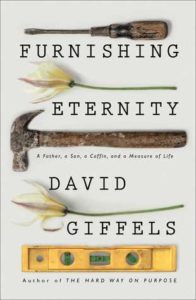
David Giffels is a writer from Akron. He wrote a column which I enjoyed for the Akron Beacon Journal for years. Then he started writing books which I also enjoy. He now writes and teaches at the University of Akron. I recently finished reading his latest book, “Furnishing Eternity.” It was so good that I knew I needed to share it with you.
“Furnishing Eternity: A Father, A Son, a Coffin, and a Measure of Life” is close to a perfect book about the parent and child relationship. When David gets the idea to build his own coffin, he relies on his father’s carpenter skills to get it done. While David imagines this as a time to learn his father’s wisdom, it becomes more a story about making time for aging and dealing with death. Having read Giffels’ book on restoring a condemned mansion, I knew this book would have a healthy amount of humor as well as emotion.
During the course of the book, David deals with two deaths: his mother and his best friend. Giffels mother and best friend both succumbed to cancer. David’s best friend was only 47 when he died. Through dealing with these deaths and trying to make sense of them, David comes to understand that making time for the living is what is really important. Making a coffin is just an excuse to spend time with his father. Carving out time for the people we care about is difficult but necessary. They will be gone too soon from our lives.
 Giffels has many wonderful lines in “Furnishing Eternity.” He talks about seeing his father: “Even when I try to see things as they are, they look the way they used to look. . . . Memory is stronger than fact.” Giffels tries to make sense of death and grief: “Grief is a collage, a bunch of vivid images thrown together without a clear order, leaving it to the viewer to decipher, only to discover that each image leads to a new one, which leads to another, endlessly elusive. The future is the past crashing through the present, and it never stops crashing.”
Giffels has many wonderful lines in “Furnishing Eternity.” He talks about seeing his father: “Even when I try to see things as they are, they look the way they used to look. . . . Memory is stronger than fact.” Giffels tries to make sense of death and grief: “Grief is a collage, a bunch of vivid images thrown together without a clear order, leaving it to the viewer to decipher, only to discover that each image leads to a new one, which leads to another, endlessly elusive. The future is the past crashing through the present, and it never stops crashing.”
More on the experience of grief: “What I found was something more cyclical, something like the surf. The movement was forward and backward, forward and backward. There was progress, but it was not steady. It felt like I was traveling on a Mobius strip, never certain which side of the experience I was on.” “What seems truest to me now is that death is a shattering. Grief is the chaos of wreckage. Only life can find the pattern, and only in its own sweet time. What I remember from the long season of loss was wanting each day to pass as quickly as possible. To get beyond it. I guess I missed the fact that the by[product of this wish was for my own life to rush by. I don’t think I’ll ever be beyond it. It just becomes part of the pattern.”
Interspersed with these reflections on death and grief are lighter moments and humorous stories about life. One of my favorite lines in the books is “One of my long-standing goals is not to die an ironic death.”
It is clear from “Furnishing Eternity” that David Giffels loves and honors his parents and his relationships. Giffels unearths the important, mundane moments in life. The times that give our lives meaning. An admiration for hard work done well. For a life lived well and fully shared with others.
I read this book at the perfect time in my own life. It made me smile and cry and reflect on my relationships with the people that are important to me. As soon as I finished “Furnishing Eternity” I bought copies to share with friends who are going through the same stage in their lives. May we all take time to reflect on life and death and making time for important relationships.

One comment